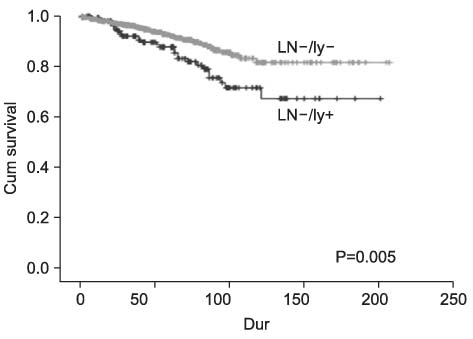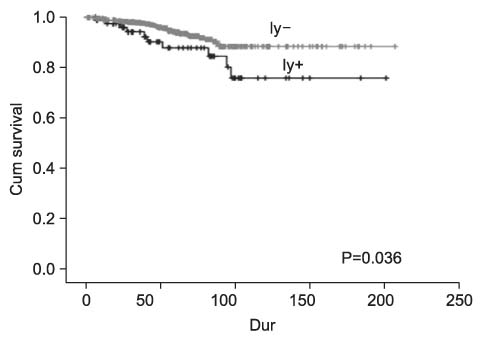J Gastric Cancer.
2010 Jun;10(2):55-62.
Clinicopathologic Characteristics in Node-negative Gastric Cancer Patients According to the Presence of Lymphatic Invasion
- Affiliations
-
- 1Department of Surgery, College of Medicine, Hanyang University, Seoul, Korea. sjkwon@hanyang.ac.kr
Abstract
- PURPOSE
We evaluated the clinicopathological charicterics and prognostic impacts of lymphatic vessel invasion in gastric cancer without lymph node involvement.
MATERIALS AND METHODS
Among 1,795 patients who underwent gastric surgery with gastric cancer at the department of surgery, Hanyang university college of medicine from June 1992 to March 2009, we retrospectively evaluated 890 patients with lymph node negative gastric cancer.
RESULTS
The lymphatic vessel invasion correlated significantly with tumor stage, age, tumor size, perineural invasion and operation method. The survival rates were only significantly different between the patients with and without lymphatic vessel invasion in patients with stage Ia (P=0.036). Univariate and multivariate analysis demonstrated that blood vessel invasion and preoperative serum CEA level were significant factor influencing the survival rate in lymph node negative gastric cancer patients with lymphatic invasion.
CONCLUSIONS
In patients with lymph node negative gastric cancer, the survival rate is significantly lower in those with lymphatic vessel invasion than in those without. Especially, in patients with stage Ia gastric cancer, the survival rates is significantly different between those with and those without lymphatic vessel invasion. Blood vessel invasion and preoperative serum CEA level is an adverse prognostic indicator in patients with stage Ia gastric cancer with lymphatic invasion. Thus we should consider further adjuvant therapies in case of need and need to show more concern to identify gastric cancer patients early at risk for recurrence.
Keyword
MeSH Terms
Figure
Reference
-
1. http://www.cancer.go.kr/. Accessed December 28, 2009.2. Kim W, Park CH, Park SM, Park WB, Lim KW, Kim SN. Prognostic significance of lymphatic and perineural invasions in patients with gastric cancer who have no lymph node and serosal involvement. J Korean Gastric Cancer Assoc. 2001. 1:77–82.
Article3. Huh H, Hyung WJ, Chen J, Choi SH, Noh SH. Implication of lymphatic or blood vessel invasion in early gastric cancer. J Korean Surg Soc. 2003. 64:134–139.4. Liu C, Zhang R, Lu Y, Li H, Lu P, Yao F, et al. Prognostic role of lymphatic vessel invasion in early gastric cancer: a retrospective study of 188 cases. Surg Oncol. 2010. 19:4–10.
Article5. Kim JJ, Song KY, Hur H, Hur JI, Park SM, Park CH. Lymph node micrometastasis in node negative early gastric cancer. Eur J Surg Oncol. 2009. 35:409–414.
Article6. Sako A, Kitayama J, Ishikawa M, Yamashita H, Nagawa H. Impact of immunohistochemically identified lymphatic invasion on nodal metastasis in early gastric cancer. Gastric Cancer. 2006. 9:295–302.
Article7. Braun M, Flucke U, Debald M, Walgenbach-Bruenagel G, Walgenbach KJ, Höller T, et al. Detection of lymphovascular invasion in early breast cancer by D2-40 (podoplanin): a clinically useful predictor for axillary lymph node metastases. Breast Cancer Res Treat. 2008. 112:503–511.
Article8. Saptefraţi L, Cîmpean AM, Ciornîi A, Ceauşu R, Eşanu N, Raica M. Identification of lymphatic vessels and prognostic value of lymphatic microvessel density in lesions of the uterine cervix. Rom J Morphol Embryol. 2009. 50:589–594.9. Walgenbach-Bruenagel G, Tolba RH, Varnai AD, Bollmann M, Hirner A, Walgenbach KJ. Detection of lymphatic invasion in early stage primary colorectal cancer with the monoclonal antibody D2-40. Eur Surg Res. 2006. 38:438–444.
Article10. Ichikawa D, Kubota T, Kikuchi S, Fujiwara H, Konishi H, Tsujiura M, et al. Prognostic impact of lymphatic invasion in patients with node-negative gastric cancer. J Surg Oncol. 2009. 100:111–114.
Article11. Gao P, Zhou GY, Zhang QH, Su ZX, Zhang TG, Xiang L, et al. Lymphangiogenesis in gastric carcinoma correlates with prognosis. J Pathol. 2009. 218:192–200.
Article12. Da MX, Wu Z, Tian HW. Tumor lymphangiogenesis and lymphangiogenic growth factors. Arch Med Res. 2008. 39:365–372.
Article13. Woo JT, Park KH, Yu YW, Park SW, Lee HI, Joo DH, et al. Lymphatic, vessel, and neural invasions in gastric cancer and its significance in prognosis. J Korean Surg Soc. 2000. 58:389–395.14. Hyung WJ, Lee JH, Choi SH, Min JS, Noh SH. Prognostic impact of lymphatic and/or blood vessel invasion in patients with node-negative advanced gastric cancer. Ann Surg Oncol. 2002. 9:562–567.
Article15. Del Casar JM, Corte MD, Alvarez A, García I, Bongera M, Gonzílez LO, et al. Lymphatic and/or blood vessel invasion in gastric cancer: relationship with clinicopathological parameters, biological factors and prognostic significance. J Cancer Res Clin Oncol. 2008. 134:153–161.
Article16. Kim MW, Cho YK, Lee KP, Jeong SK. Early prognostic significance of lymphatic vessel invasion in gastric cancer. J Korean Surg Soc. 1997. 53:525–534.17. Kim JH, Park SS, Park SH, Kim SJ, Mok YJ, Kim CS, et al. Clinical significance of immunohistochemically-identified lymphatic and/or blood vessel tumor invasion in gastric cancer. J Surg Res. 2009. [in print].
Article18. Nakamura Y, Yasuoka H, Tsujimoto M, Kurozumi K, Nakahara M, Nakao K, et al. Importance of lymph vessels in gastric cancer: a prognostic indicator in general and a predictor for lymph node metastasis in early stage cancer? J Clin Pathol. 2006. 59:77–82.
Article19. Yu JW, Wu JG, Tajima Y, Li XQ, Du GY, Zheng LH, et al. Study on lymph node metastasis correlated to lymphangiogenesis, lymphatic vessel invasion, and lymph node micrometastasis in gastric cancer? J Surg Res. 2009. 11:1–9.
Article20. Hyung WJ, Cheong JH, Kim J, Chen J, Choi SH, Noh SH. Application of minimally invasive treatment for early gastric cancer. J Surg Oncol. 2004. 85:181–186.
Article21. Kunisaki C, Makino H, Kimura J, Takagawa R, Kosaka T, Ono HA, et al. Impact of lymphovascular invasion in patients with stage I gastric cancer. Surgery. 2010. 147:204–211.
Article
- Full Text Links
- Actions
-
Cited
- CITED
-
- Close
- Share
- Similar articles
-
- Clinicopathologic Significance of Lymphatic Vessel Invasion and Blood Vessel Invasion in Gastric Cancer
- The Significance of Lymphatic, Venous, and Neural Invasion as Prognostic Factors in Patients with Gastric Cancer
- Prognostic Factors on Overall Survival in Lymph Node Negative Gastric Cancer Patients Who Underwent Curative Resection
- Risk Factors Affecting Lymph Node Metastasis and Recurrence in Early Gastric Cancer
- Clinical Significance of Lymph Node Micrometastasis in Stage I and II Colon Cancer



